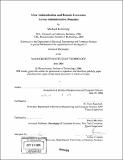User authentication and remote execution across administrative domains
Author(s)
Kaminsky, Michael, 1976-
DownloadFull printable version (6.080Mb)
Other Contributors
Massachusetts Institute of Technology. Dept. of Electrical Engineering and Computer Science.
Advisor
M. Frans Kaashoek and David Mazières.
Terms of use
Metadata
Show full item recordAbstract
(cont.) selectively delegates authority to processes running on remote machines that need to access other resources. The delegation mechanism lets users incrementally construct trust policies for remote machines. Measurements of the system demonstrate that the modularity of REX's architecture does not come at the cost of performance. A challenge in today's Internet is providing easy collaboration across administrative boundaries. Using and sharing resources between individuals in different administrative domains should be just as easy and secure as sharing them within a single domain. This thesis presents a new authentication service and a new remote login and execution utility that address this challenge. The authentication service contributes a new design point in the space of user authentication systems. The system provides the flexibility to create cross-domain groups in the context of a global, network file system using a familiar, intuitive interface for sharing files that is similar to local access control mechanisms. The system trades off freshness for availability by pre-fetching and caching remote users and groups defined in other administrative domains, so the file server can make authorization decisions at file-access time using only local information. The system offers limited privacy for group lists and has all-or-nothing delegation to other administrative domains via nested groups. Experiments demonstrate that the authentication server scales to groups with tens of thousands of members. REX contributes a new architecture for remote execution that offers extensibility and security. To achieve extensibility, REX bases much of its functionality on a single new abstraction-emulated file descriptor passing across machines. This abstraction is powerful enough for users to extend REX's functionality in many ways without changing the core software or protocol. REX addresses security in two ways. First, the implementation internally leverages file descriptor passing to split the server into several smaller programs, reducing both privileged and remotely exploitable code. Second, REX
Description
Thesis (Ph. D.)--Massachusetts Institute of Technology, Dept. of Electrical Engineering and Computer Science, 2004. Includes bibliographical references (p. 73-77).
Date issued
2004Department
Massachusetts Institute of Technology. Department of Electrical Engineering and Computer SciencePublisher
Massachusetts Institute of Technology
Keywords
Electrical Engineering and Computer Science.